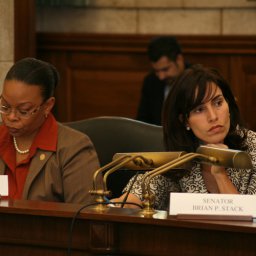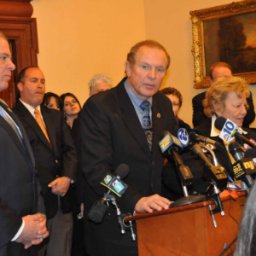
TRENTON – Senator Raymond J. Lesniak, D-Union, the Chairman of the Senate Economic Growth Committee and prime sponsor of S-1, a bill which would abolish the Council on Affordable Housing (COAH) in order to create a fair, market-driven approach to affordable housing, issued the following statement today after discussing the Senate Committee Substitute of his bill with members of the Economic Growth Committee:
“The SCS for S-1, although designed to comply with the Mount Laurel decisions, will produce twice as much affordable housing in New Jersey than the 35-year record of COAH.
“From 1985 to 2009 COAH, according to its Web site, has produced 36,000 affordable housing units. During that period the total residential building permits were 764,667. Under the SCS for S-1, all residential developments of 20 units or more will have a 10 percent set aside requirement which would have produced 76,467 affordable housing units. That number would have been reduced by developments of more than 5 units but less than 20 which will only have a 5 percent set aside requirement, and by no set asides for developments of less than 5 units. These residential developments are not economically viable with a 10 percent requirement. Nevertheless, even the 5 percent requirement applied across the board, would have bettered COAH’s performance.
“The SCS for S-1 will outperform COAH while saving the millions of tax dollars that have been wasted by COAH’s complex rules and regulations that attempt to micromanage development in New Jersey, be it residential, commercial, retail or industrial, because it will augment the free market, rather than stifle it. The SCS for S-1 will also remove the disincentives to job creation of COAH.
“In order to ensure that these affordable units are produced in all municipalities, those municipalities that do not already have a reasonable amount of affordable housing will be required to zone at least 20 percent of their developable vacant land for housing or have an application for housing development in non-residential zones be deemed to be an inherently beneficial use.
“The SCS for S-1 will also:
“1. Require all new construction of affordable housing be barrier-free for the disabled and give a 2 for 1 credit towards its definition of inclusionary for special needs housing;
“2. Allow Regional Contribution Agreements which were authorized by the sending municipality by resolution prior to July 17, 2008 – the date when RCAs where abolished – to be completed, which may result in producing thousands of affordable housing units and millions of dollars of new investment in affordable housing;
“3. Allow municipalities that have received substantive certification under COAH’s third round rules to choose to rely on that certification or come under the zoning mandates of the SCS for S-1;
“4. Allow for affordable housing to be produced off-site from a new housing development, or by rehabilitation of existing substandard units, or by payment of a fee in lieu of construction into a municipal trust fund for affordable housing;
“5. Allow a municipality to give preference for occupancy of affordable units to residents and workers in the municipality;
“6. Make surplus state property available for affordable housing at a nominal cost;
“7. Eliminate the tax on non-residential development that impedes job creation and economic growth;
“8. Exempts as developable, land which does not have reasonable access to sewer service.”
Click here to view a copy of the proposed Senate Committee Substitute for S-1.




